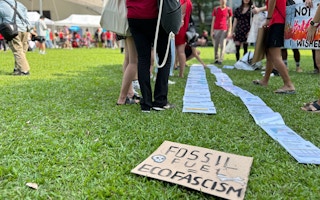A one-hectare patch of greenery in downtown Singapore turned into a sea of red on Saturday as over 1,400 people braved the heat to gather for the first physical climate rally since the city-state’s inaugural climate demonstration four years ago.
SG Climate Rally resumed its in-person assembly this year to a mostly young and slightly smaller crowd than in 2019 at Hong Lim Park, the only place in the country where Singaporean citizens are authorised to protest without a police permit.
Many demands from the previous rally have remained unmet, as reflected in the reproduction of a majority of the policy recommendations from past statements, penned in the lead-up to the COP26 and COP27 climate summits, in this year’s calls to action.
To continue reading, just sign up – it’s free!
- Get the latest news, jobs, events and more with our Weekly Newsletter delivered to you free.
- Access the largest repository of news and views on sustainability topics.
- You can publish your jobs, events, press releases and research reports here too!
Newsletter subscribers do not necessarily have a website account. Please sign up for free to continue reading!
But last October, Singapore finally announced a target to slash its greenhouse gas emissions to zero by 2050 – one of the key asks from the first rally. With this headline target in place, climate campaigners have now dedicated their work to ensuring it is reached in an inclusive and transparent manner.
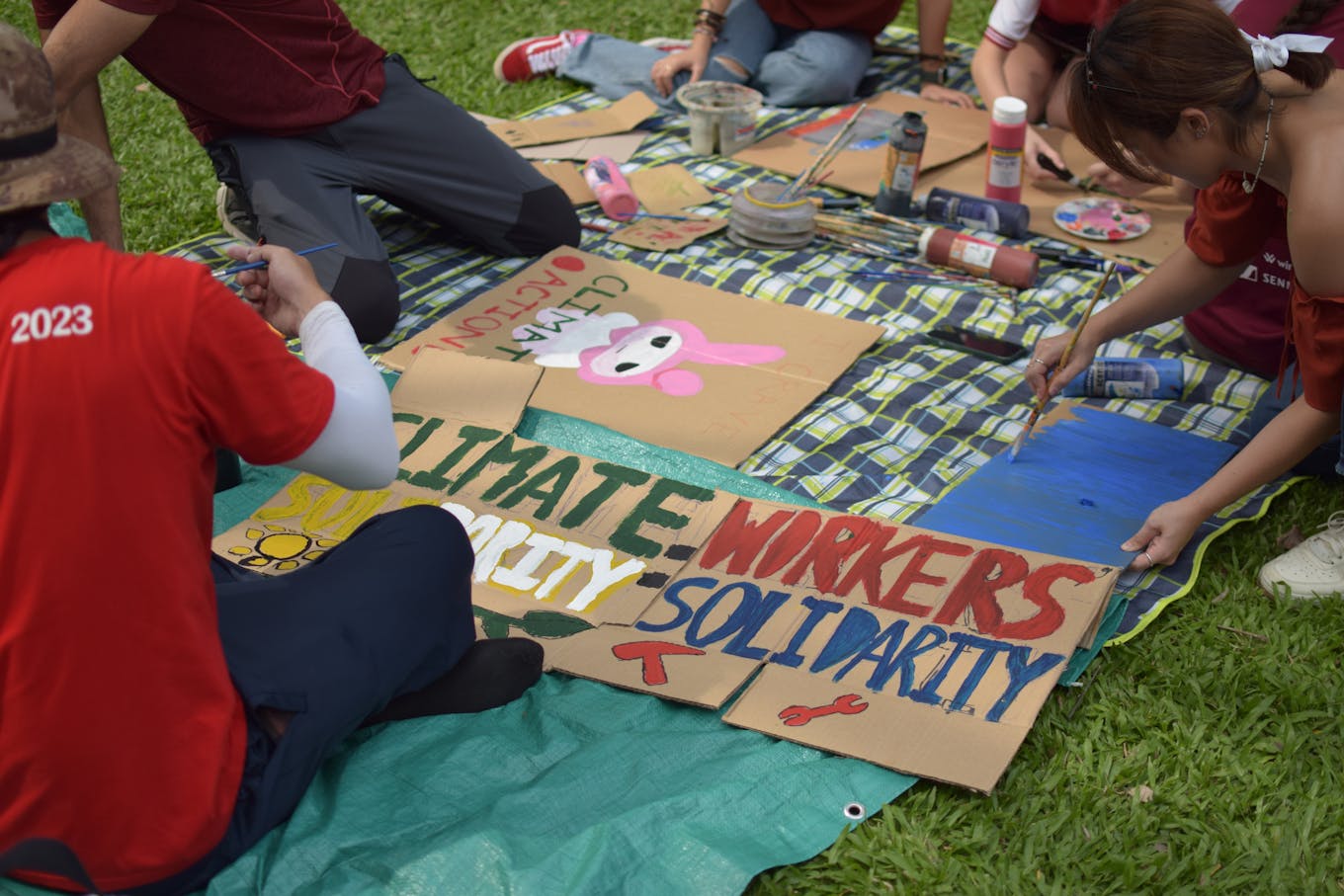
Rally-goers painting placards with climate justice slogans. “Climate solidarity equals workers solidarity.” Image: Eco-Business/Gabrielle See
For this reason, even as they push for an accelerated transition, the organisers emphasised the need for the government to engage with low-income households and vulnerable communities that are disproportionately impacted not just by climate change, but mitigation strategies such as raising the carbon tax.
29-year-old Kristian-Marc James Paul, one of the organisers and founding members of the rally told Eco-Business: “We are equally worried about cost of living. Which is why we try to promote the message of climate justice, because if we are thinking about mitigating climate change, we have to do it in an inclusive way.”
Tackling climate-fuelled inequalities
The intensifying heat in Singapore – which reached 37 degrees Celsius, the highest temperature in four decades, earlier this May – has exposed heat-related inequality, where low-income households and workers are most exposed to risks brought about by the record temperatures.
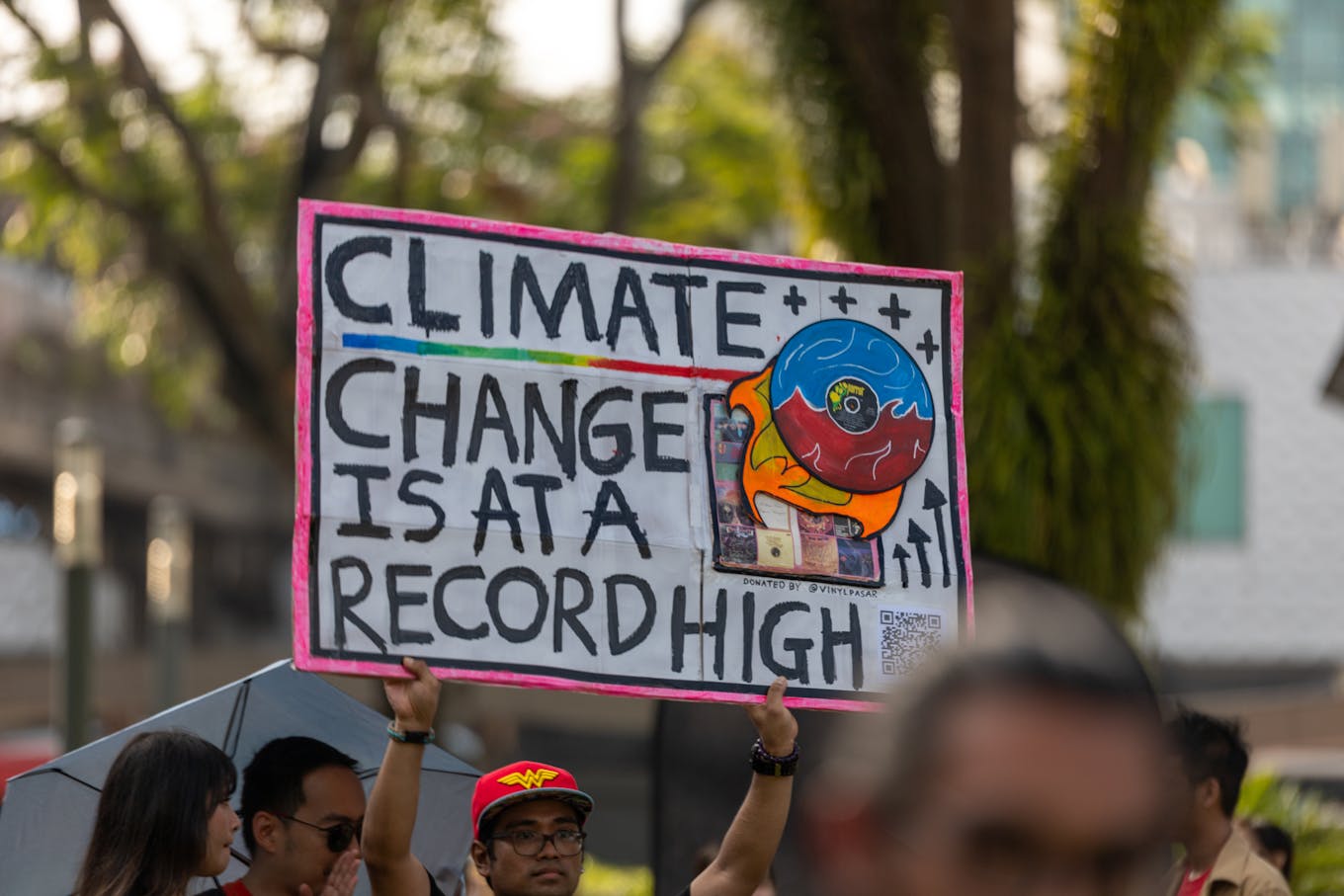
“Climate change is at a record high.” Singapore experienced its warmest weather for four decades in May. Image: Firdaus Firlany
In a speech at the rally, Marlina Yased, a 45-year-old community worker, spoke about how the “increasingly terok” (meaning unbearable in Malay) heat has affected the daily lives of those in her rental neighbourhood flat, where she has lived and volunteered for the past 13 years.
Unlike 80 per cent of Singaporean households who can just switch on their air-conditioners to beat the heat, rental housing tenants like Yased are unable to install air conditioning units without seeking prior permission from the state’s Housing Development Board – a process which could take months and requires proof of heat-related medical conditions.
In her estate of Lengkok Bahru, which houses 549 one- to two-room rental units spanning six blocks, there are often no less than five people living in each flat, Yased said. These cramped conditions have made it harder for them to escape the heat, which can take a toll on their work, relationships and mental health.
Portable air-conditioners, while an alternative, are considered a luxury, said Yased. “Putting food on the table and paying our bills already take up most of our income. Don’t even get me started on the increase in electricity and utilities bills. Every quarter this year we have seen an increase. Meanwhile our wages have not seen much change.”
Progress Singapore Party secretary-general Leong Mun Wai, who is also a non-constituency member of parliament, recently posed a question in parliament about whether the government would consider relaxing the rules for rental flat tenants to install air-conditioners. In response, the governing ministry doubled down on its stance that such requests are considered on a case-by-case basis.
“That should change because if temperatures continue to go up, a lot of the older folks and lower-income families will be affected,” Leong told journalists on the sidelines of the event.
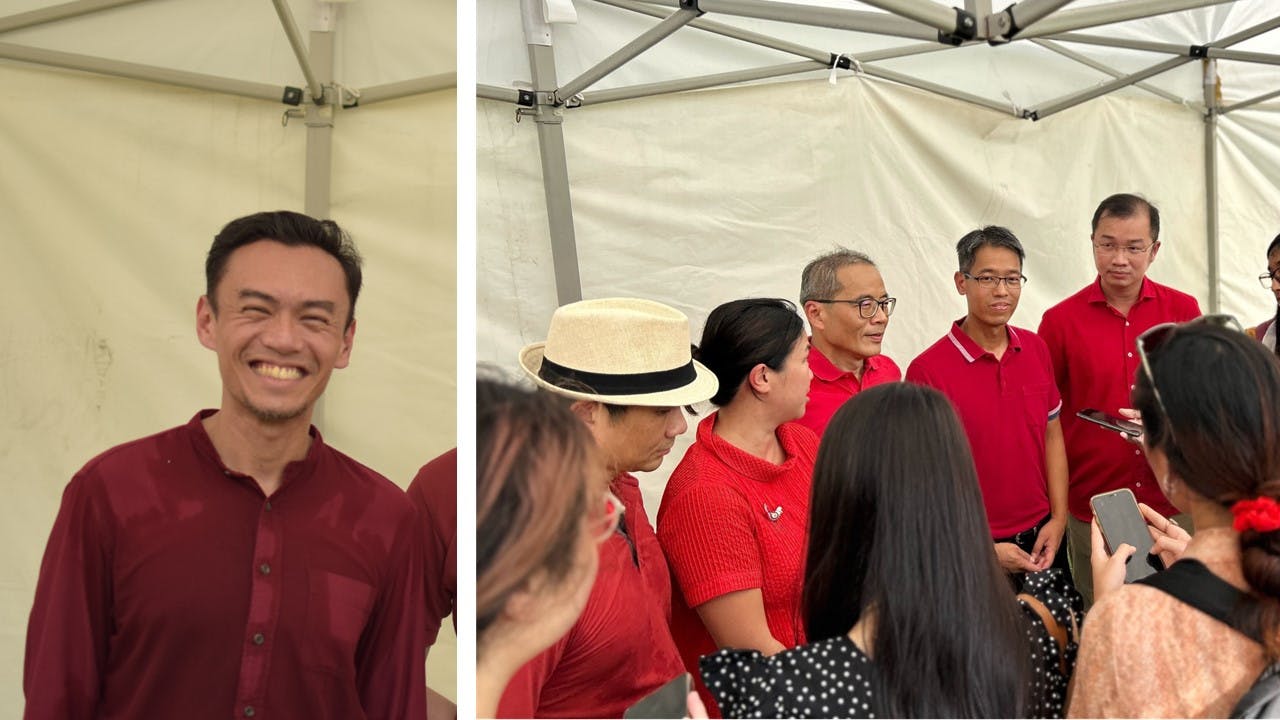
Elected members of parliament spotted at the rally. From left: Wan Rizal from the incumbent People’s Action Party; opposition members Jamus Lim, He Ting Ru, Denise Tan, Gerald Giam and Louis Chua from the Workers’ Party: Images: Eco-Business/Gabrielle See and Ng Wai Mun
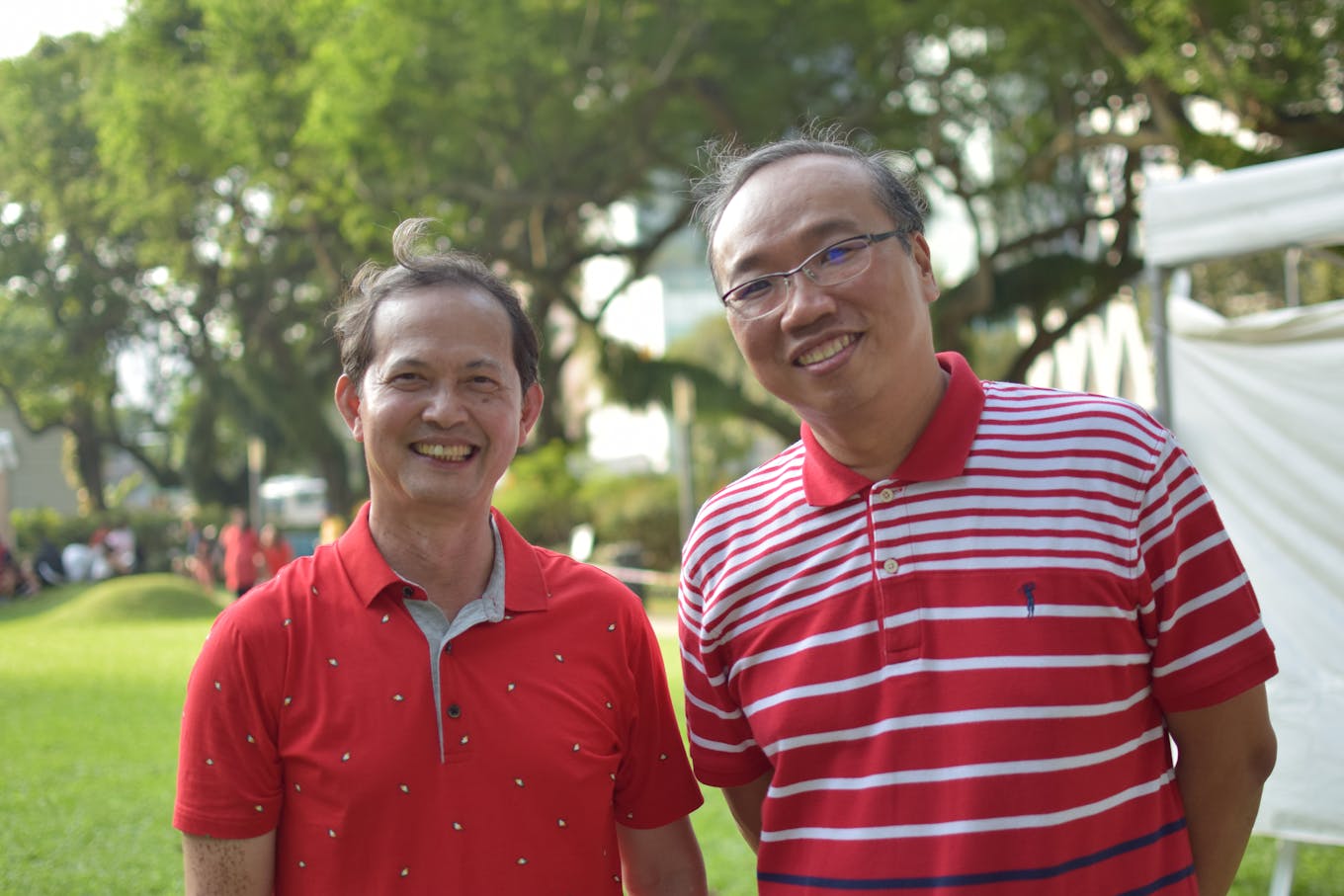
Opposition non-constituency member of parliament and secretary-general Leong Mun Wai (left) and deputy organising secretary Jeffrey Khoo (right) of Progress Singapore Party. Image: Eco-Business/Gabrielle See
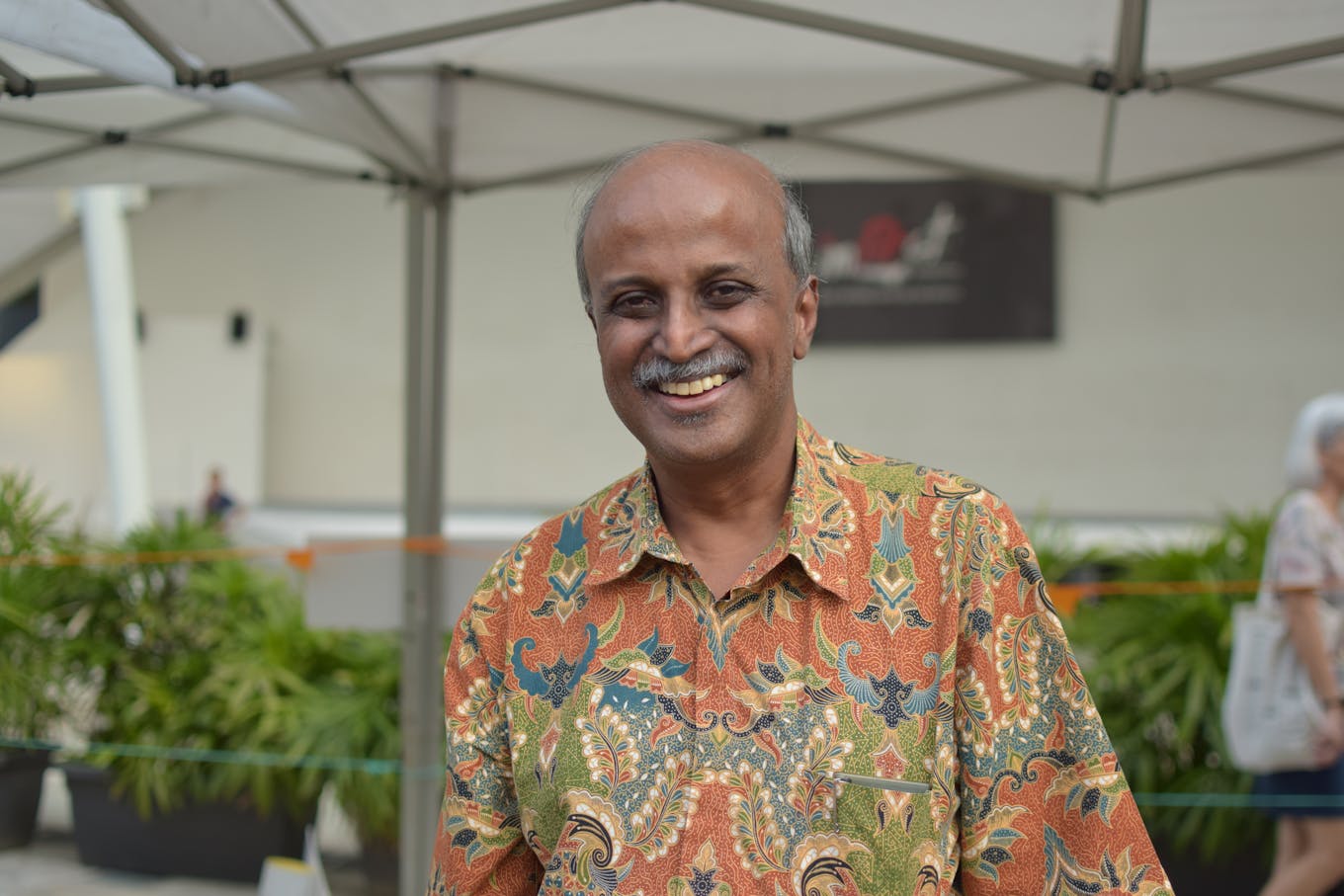
Singapore Democratic Party chairman Dr Paul Tambyah, who spoke at the virtual rally in 2021 about the impact of environmental issues on public health, cited exposure of workers to toxic gas on Jurong Island as an example of the health damage caused by the current fossil fuel-driven economy. Image: Eco-Business/Gabrielle See
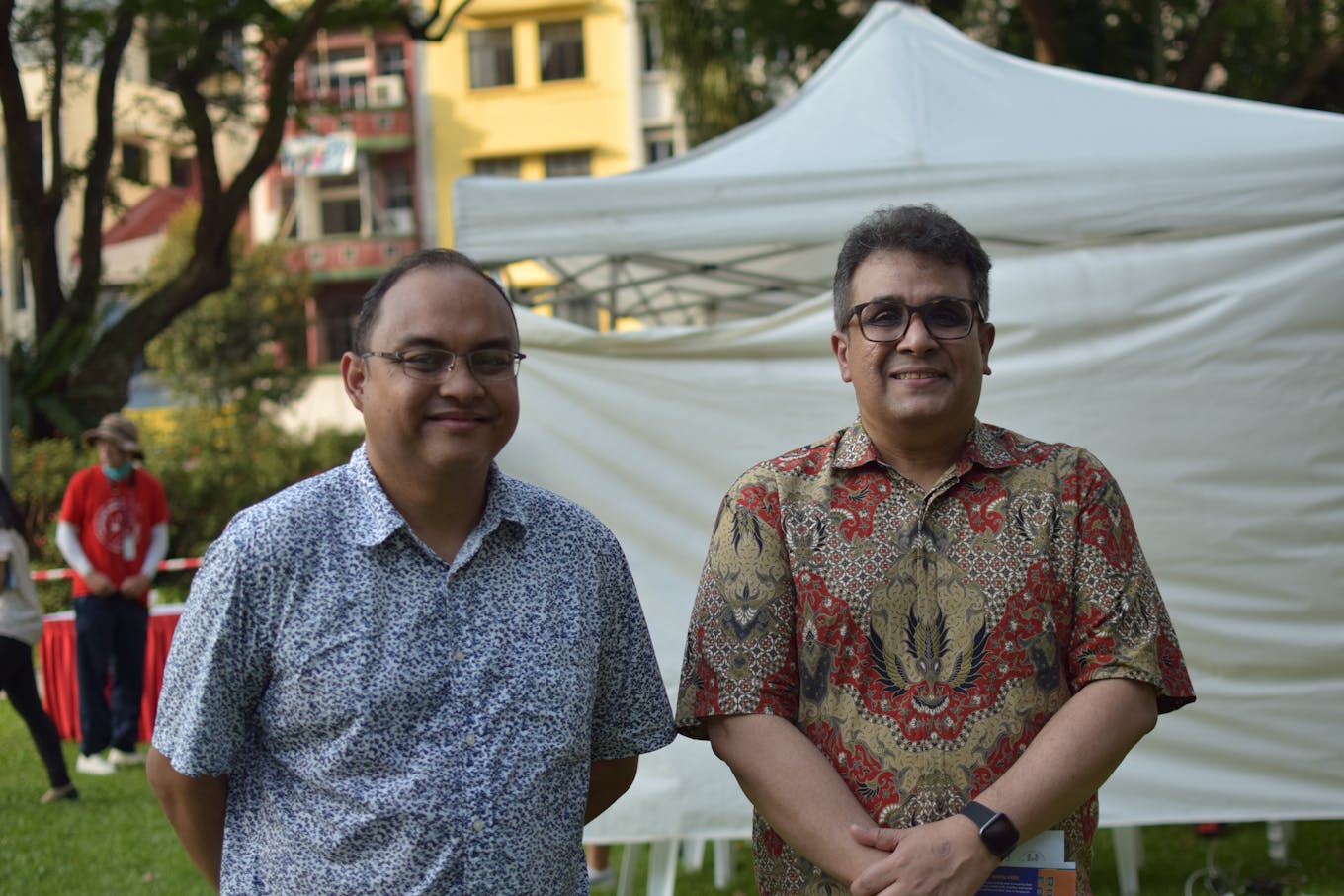
Red Dot United member Fazli Talip (left) and secretary-general Ravi Philemon (right) showed out in support of their party members, who are actively involved in the rally. Image: Eco-Business/Gabrielle See
The city-state’s rising temperatures have also intensified the health risks posed to the workers most exposed to the heat.
A spokesperson from Migrant Mutual Aid, an advocacy group which distributes resources to migrant workers in Singapore, recounted instances where extended hours of work in the heat have led to injuries and deaths.
Migrant workers residing in dormitories with inadequate ventilation have resorted to removing their mattresses to sleep on their cooler bed frames, their spokesperson said.
However, the same climate policies meant to combat global warming can exacerbate inequalities.
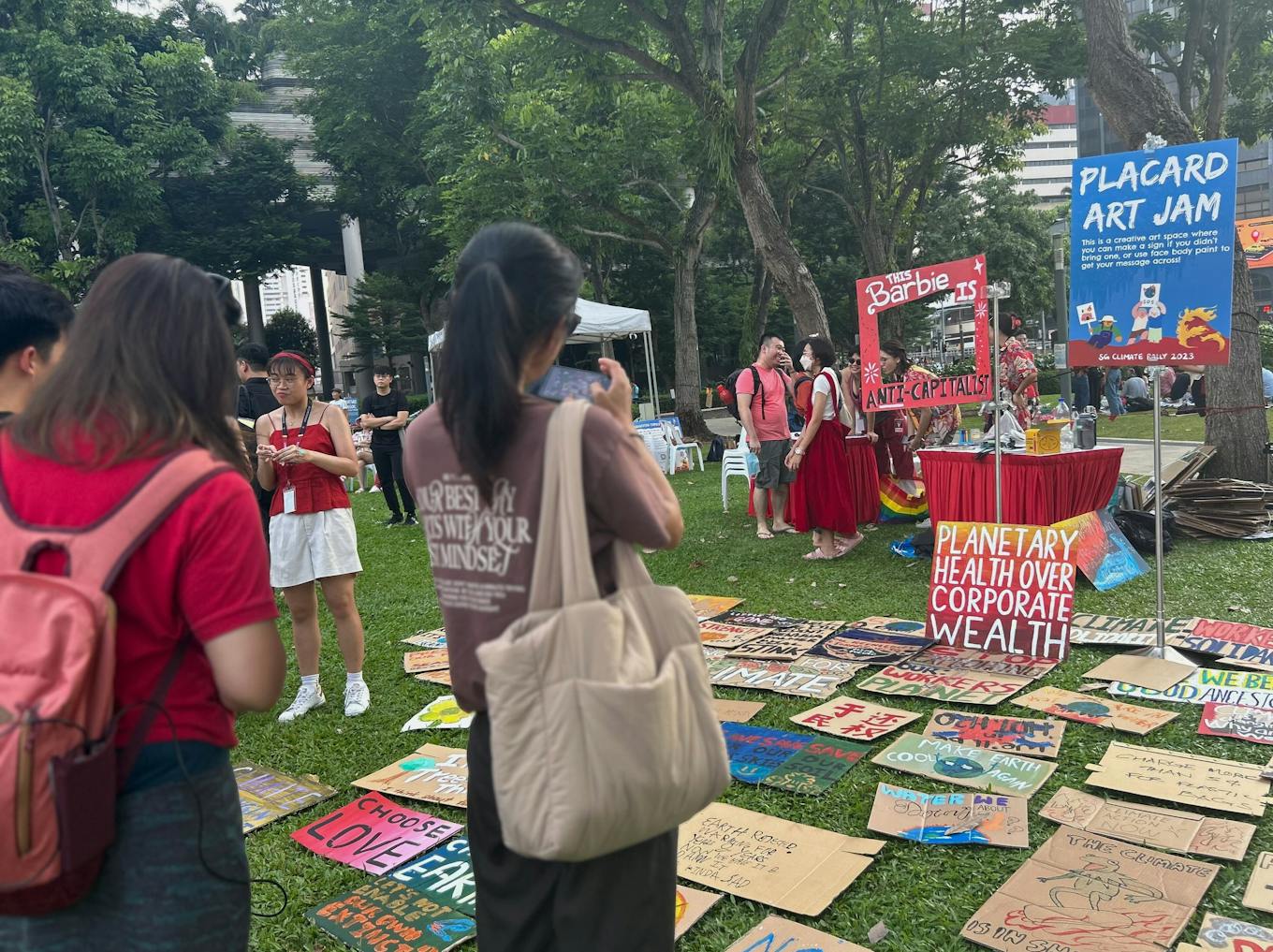
“Planetary health over corporate wealth.” Image: Eco-Business/Ng Wai Mun
29-year-old Yi Hung, a delivery rider who is a member of SG Climate Rally, recalled how the group spoke out against the petrol price hike back in 2021, which was framed by the government as a way to combat climate change under the Singapore Green Plan.
“It was quite clear the hike would most likely go ahead, but the more important point was to make sure that the environmental movement in Singapore is not seen as supporting measures that pass on the cost of the energy transition to the working class,” he said.
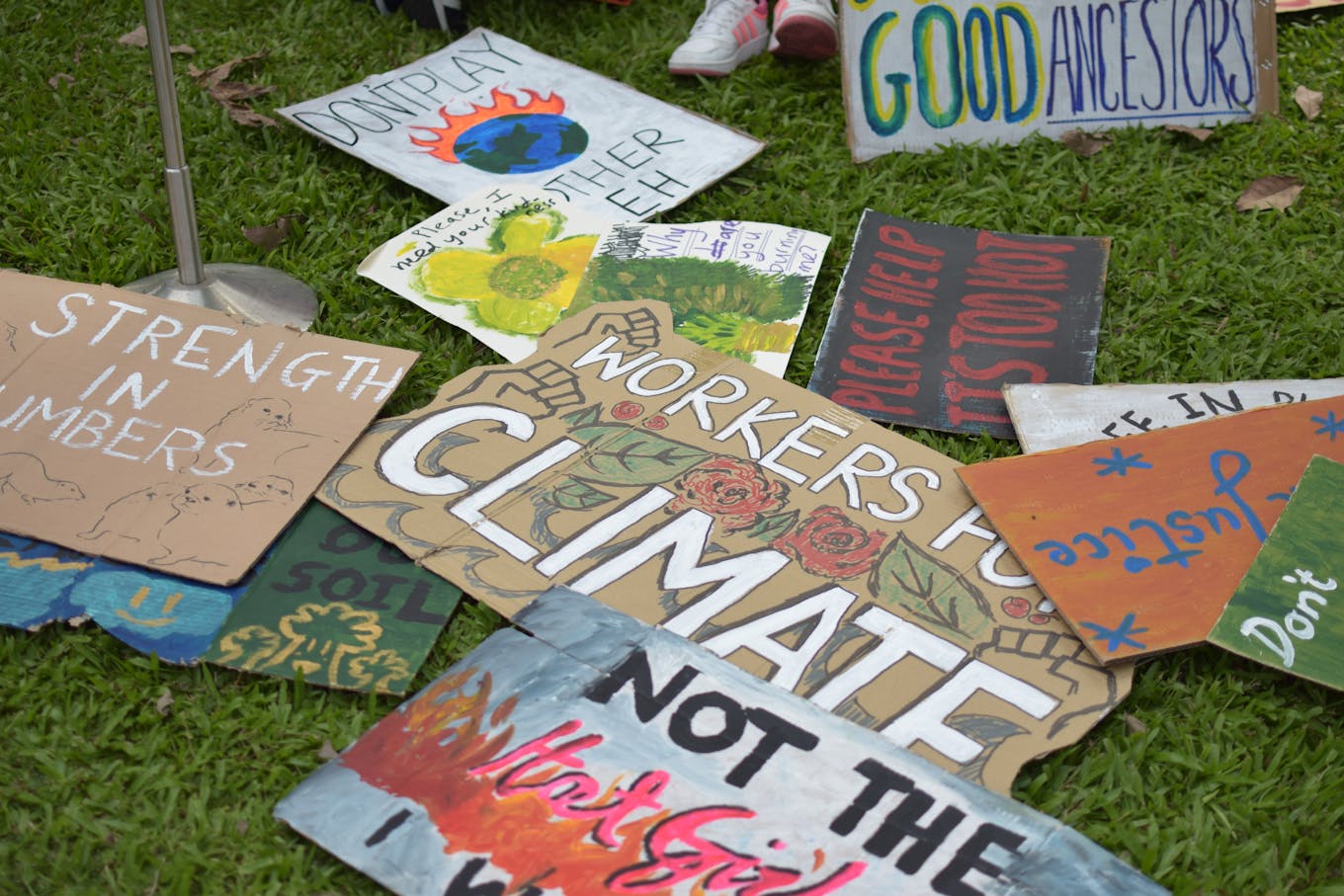
“Workers for climate.” Image: Eco-Business/Gabrielle See
Yi Hung, who is now part of SG Riders, a collective of delivery riders advocating for their rights to fair employment in Singapore, admitted that the climate crisis is not at the forefront of most riders’ minds even though they feel its impacts, as many of them have more pressing day-to-day issues to worry about.
22-year-old Dexter Lok, a student at Nanyang Technological University and volunteer with the local workers’ rights group Workers Make Possible, told Eco-Business: “Currently, there doesn’t seem to be any protection for the workers while the companies transition. It seems like the government is saying we should transition and lets corporations do whatever they want. What often happens is that they fire older staff and then just hire people with new skill sets.”
Make the biggest polluters pay
In Yased’s speech, she called for the government to protect low-income groups against the rising cost of living and to strengthen the carbon tax in a way where elites polluting the most bear the brunt of the cost.
“Working class rental flat residents did not cause the climate crisis. We should therefore not have to pay anymore for it,” said Yased.
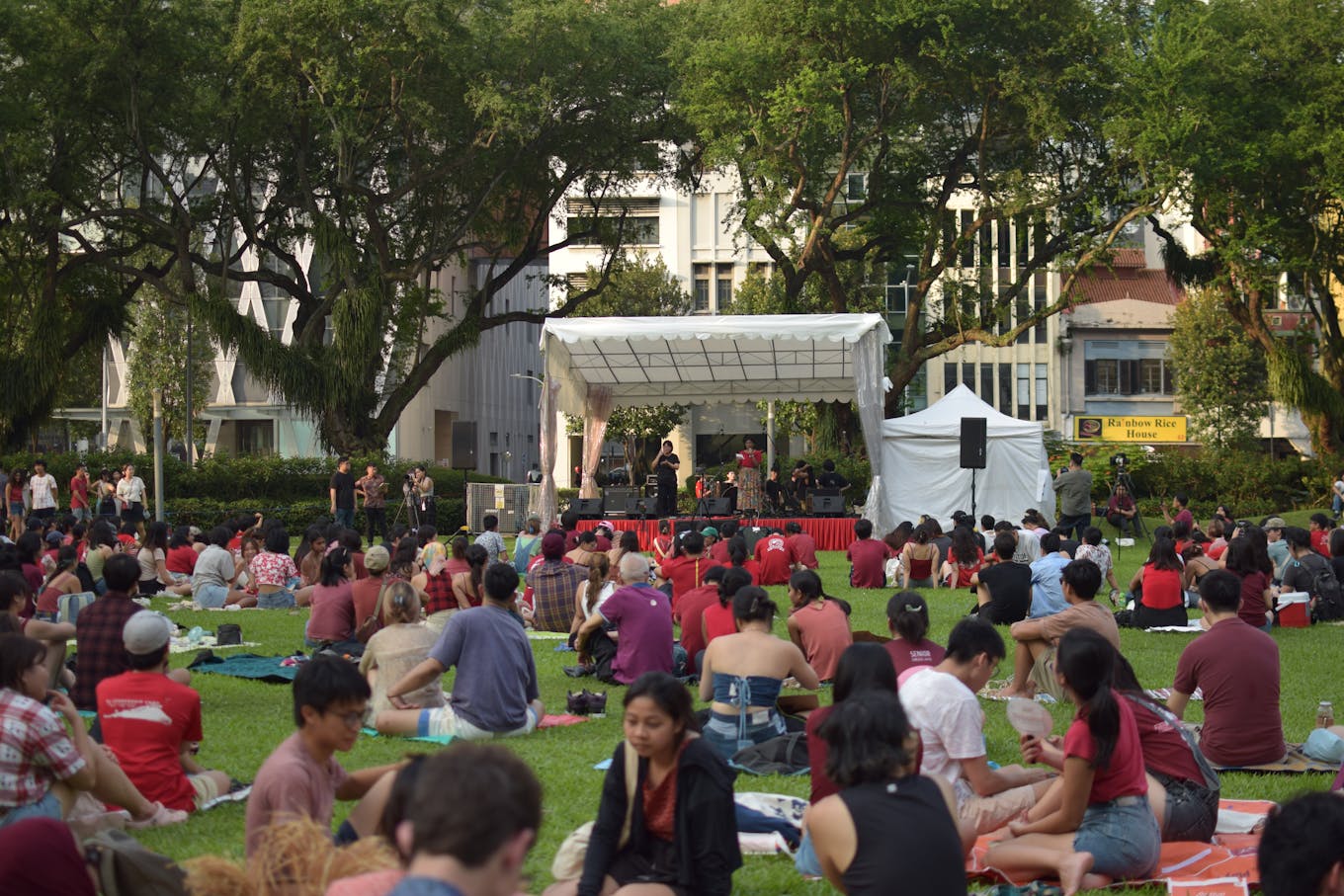
A mostly young crowd listens to a speech by Madhumitha Ardhanari at the first physical SG Climate Rally in four years held at Hong Lim Park, the city-state’s designated area for public protest. Image: Eco-Business/Gabrielle See
Ho Xiang Tian, 27 year-old co-founder of environmental group LepakInSG, called out industries that have blocked environmental action at the expense of taxpayers.
Ho singled out the packaging industry for blocking the introduction of an Extended Producer Responsibility (EPR) scheme by the state’s National Environment Agency that would make producers pay for the waste generated in Singapore in 2005.
This has resulted in a two-decade delay of EPR for packaging waste, which will only come into effect in 2025, said Ho.
“In the meantime, Semakau landfill is running out of space. And when a new landfill has to be built for our waste, it’s the taxpayers that will pay for it, not the packaging industry which has been profiting off this.”
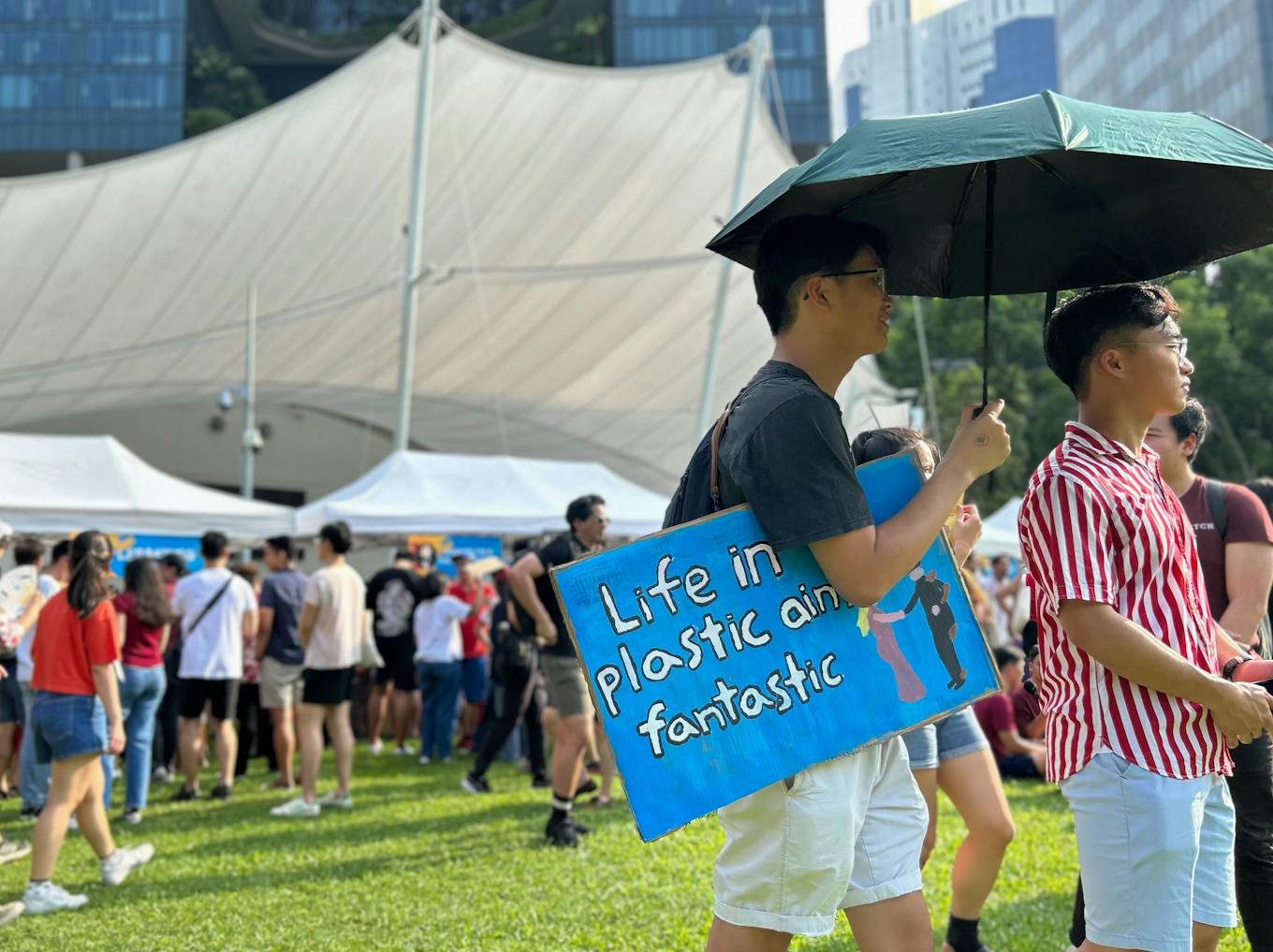
“Life in plastic ain’t fantastic.” Image: Eco-Business/Ng Wai Mun
Many rally-goers shared the speakers’ sentiments that costs involved in the transition should be borne by the biggest polluters and not those who have contributed the least to global warming, including Pamela Low, founder of Tingkats, an initiative which partners with businesses to create sustainable development strategies.
“The reason you’re seeing so many young people here is because we are the ones who are going to have to pay for climate change. We are the ones who are going to have to pay higher taxes and for the measures needed to live in a hotter climate,” Low told Eco-Business.
But one attendee had a very different view.
37-year-old Henry Chew, a business administator who attended the last rally in support of fossil fuels, disagreed that raising the carbon tax and using the proceeds to subsidise low-income households is a sensible way to ensure affordable energy prices.
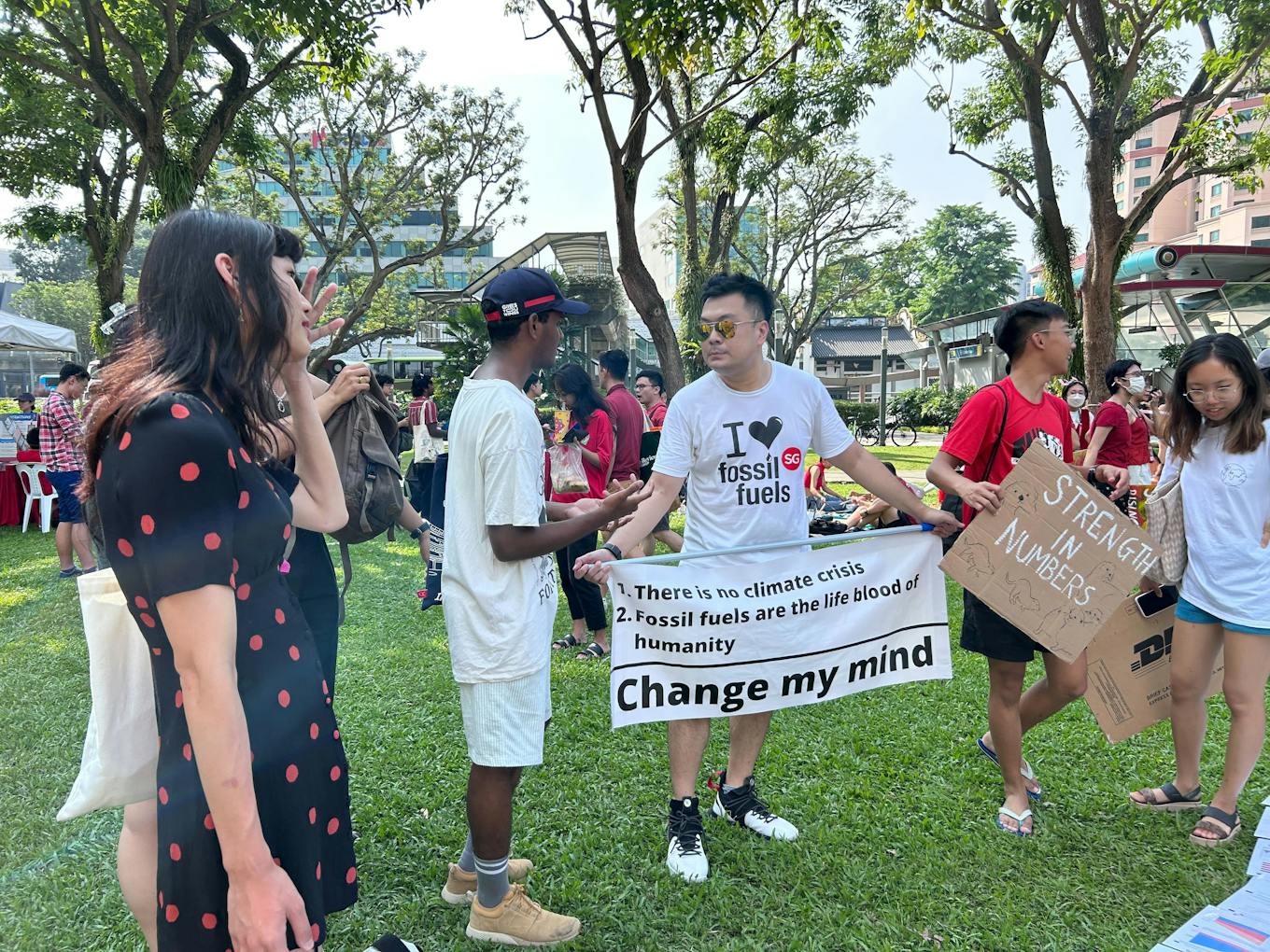
Rally-goers engaging with pro-fossil fuels campaigner Henry Chew, who was also present at the 2019 rally. Image: Eco-Business/Ng Wai Mun
“If you want to do that, why raise the tax in the first place? Electricity costs are very important, especially to the lowest income group. So if you don’t raise carbon tax, you won’t be hurting the poor,” said Chew, who stressed that while he is against “climate alarmism”, he is not a climate change denier.
When Eco-Business pointed Chew to the worker rights groups who back climate campaigners in calling for an increase in carbon tax for companies, he responded, “I think they are confused in joining this movement.”
Despite wearing an “I love fossil fuels” t-shirt, Chew said: “I’m not a spokesperson for fossil fuels. I’m a spokesperson for ordinary people who are not here. I’m trying to represent the rest of society who may not be climate alarmists or environmentalists.”
‘Activism can be quiet’
SG Climate Rally has come to be known as the “political” flank of the republic’s environmental movement, a characterisation that its organisers embrace.
27-year-old organiser Tan Heng Yeng told Eco-Business that the group hopes to “politicise the climate crisis” and encourage citizens to “exercise their political muscle” beyond party politics. SG Climate Rally is therefore less interested in scoring consultations with the state and corporations – an endeavour it leaves to other groups with closer ties to these bodies to pursue.
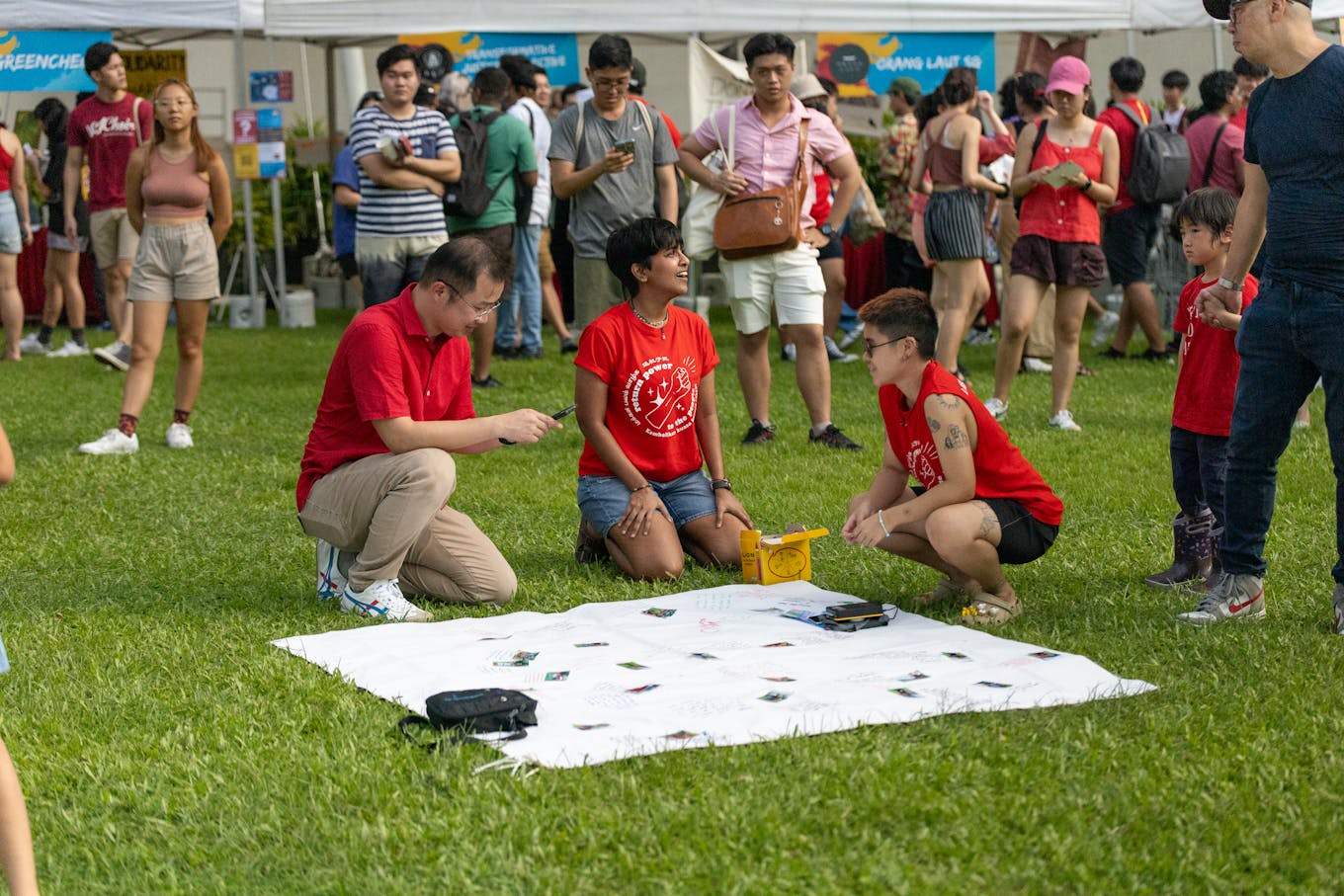
Rally-goers, including Workers’ Party member of parliament Louis Chua (left), participating in an art project by community organiser Elijah Tay (right), which maps out their collective stakes. Image: Firdaus Firlany
This is clear from campaigns the group has run over the years, including “Postcard to My MP”, where attendees can write postcards to their elected representatives to demand for bolder climate policies. The exercise yielded 309 postcards this year.
In 2019, when the activity was introduced, 418 postcards were mailed to 80 members of parliament. While only seven MPs responded, the number of questions posed about climate change in parliament increased threefold that year..
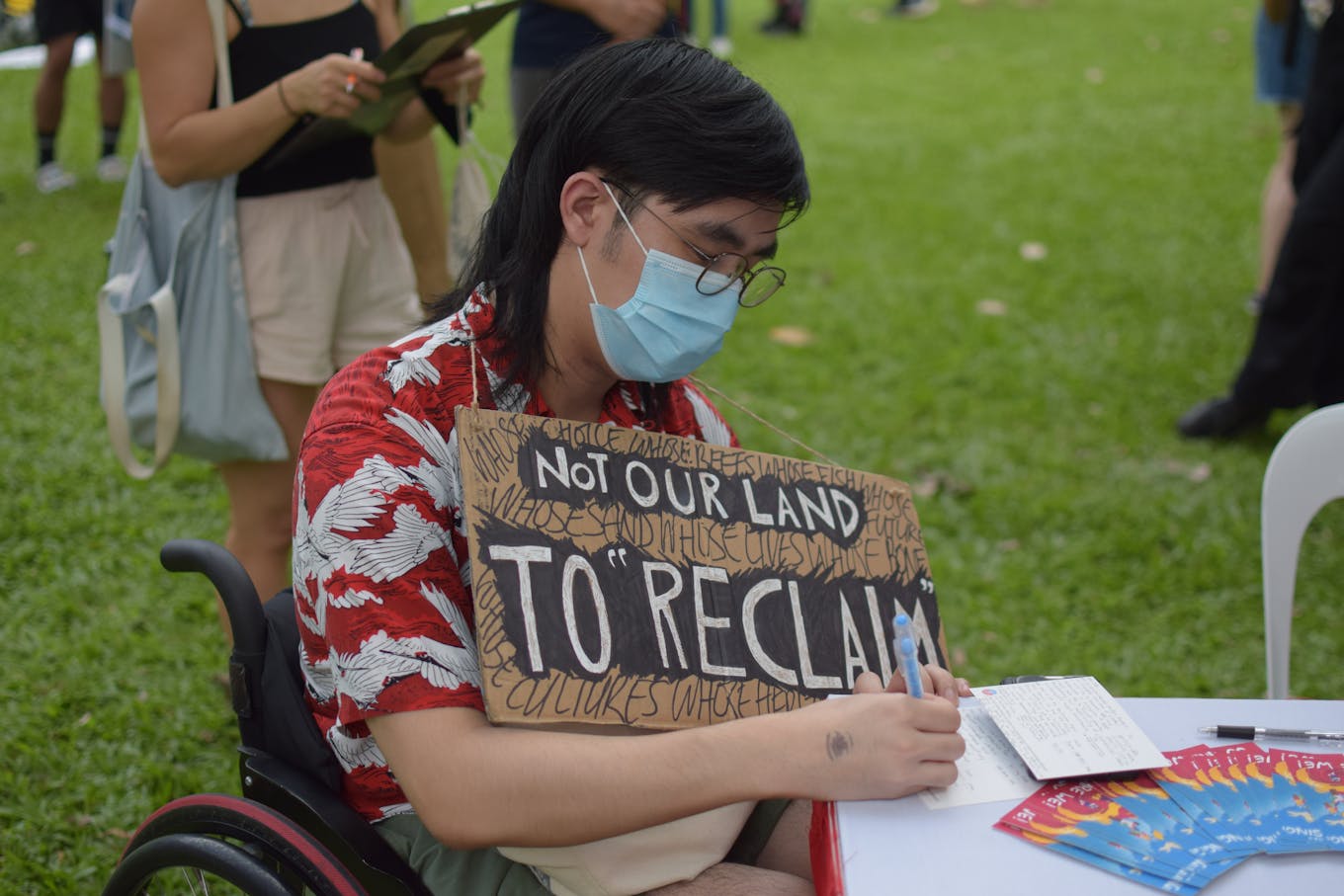
Environmental studies student Joshua Choo at the “Postcard to My MP” booth with a sign that reads, “Not our land to ‘reclaim’.” Singapore has increased its land area by more than 25 per cent since the 1970s using sand imported from neighbouring countries. Image: Eco-Business/Gabrielle See
But this year’s closing action highlighted how “activism can be quiet” too, said Chloe Chotrania, a performance artist who led participants through a “rain clap”, an activity where varying intensities of clapping represented how power can grow the more interconnected people are with each other. Chotrani said, “Power can be quiet, it doesn’t have to be loud.”
The routine she facilitated this year replaced the 2019 rally’s mass “die-in”, where attendees simulated dying to mourn the potential loss of human lives and biodiversity in a warming world – an activity that drew some flak from netizens.
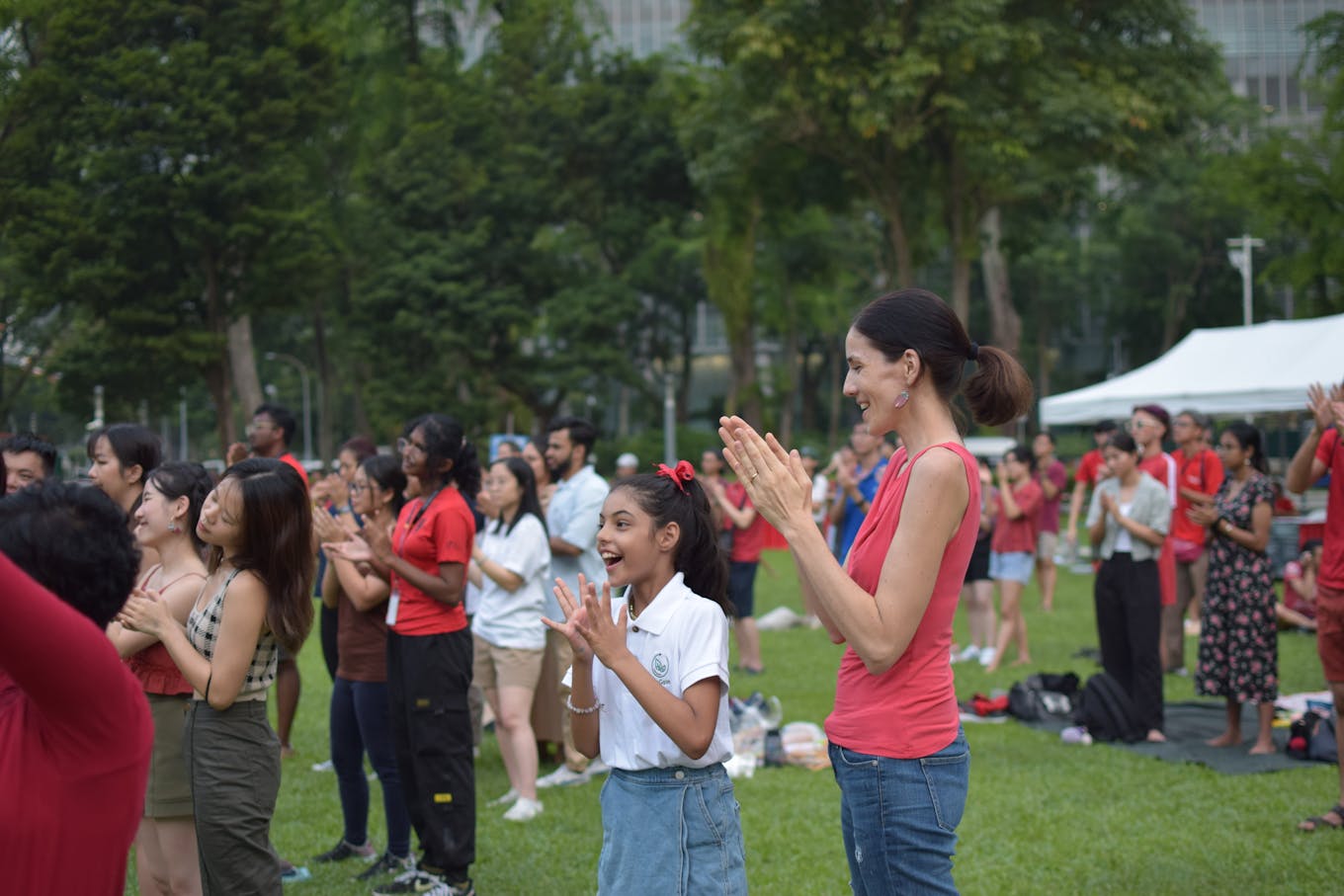
Attendees participating in the closing action of the rally. Image: Eco-Business/Gabrielle See
Acknowledging the shift in atmosphere from the 2019 rally, Tan said: “The mood of the first rally channelled a lot more grief and anger. This year, we wanted to try and turn that into something that felt more hopeful, positive and empowering, because of how climate action in Singapore has progressed over the past few years.”
“We wanted to make sure that everyone could feel included in all the activities, especially people newer to thinking about the climate crisis, who might have felt that the die-in [in 2019] was a bit much for them,” she added.
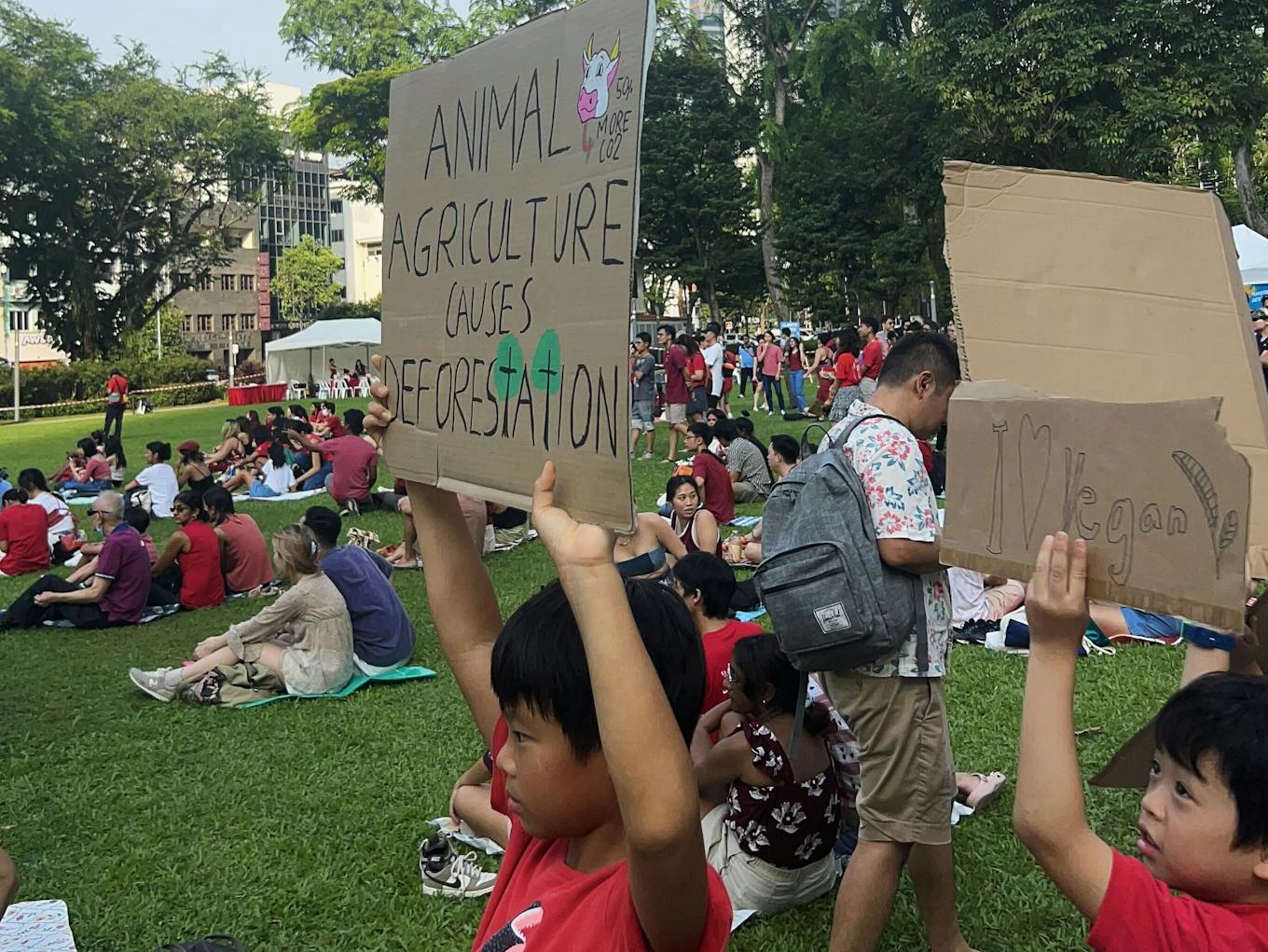
“Animal agriculture causes deforestation.” Image: Eco-Business/Ng Wai Mun
Noting the smaller crowd size this year, Robin Rheaume who runs local recycling information website Recyclopedia, said: “It might be that climate issues are just quite overwhelming and some people feel like they are going to get depressed about the situation if they come here.”
“We have to understand that while encouraging people to lean in and find ways to participate in the movement,” she said.

Robin Rheaume, founder of Recyclopedia.sg, said that the rally offers a chance for people to connect and feel less discouraged. Image: Eco-Business/Ng Wai Mun
36-year-old consultant Shaun Koh, a first-time climate rally attendee, commented that the numbers “reflected the sense that while climate issues are definitely now more popular in Singapore, they appear to be far from the mainstream.”
But Tan noted that the lower turnout at this year’s rally, compared to the 2,000-plus crowd in the first rally, is in line with global trends.
In 2019, known as “the year of the climate strike” in the environmental movement, climate change protests spearheaded by Swedish activist Greta Thunberg gained momentum worldwide. But the turnout for climate strikes, compared to 2019, has declined in many cities around the world, including Vancouver and New York. The number of countries taking to the streets for the global climate strike has also shrunk by nearly three times, from 185 in 2019 to 65 countries this year.
While this year’s rally catered to a family-friendly audience, the crowd was still largely made up of students and young adults.
“We wanted to target a diverse range of people, but I feel like the population that is very actively thinking about the climate crisis in Singapore is young people,” Tan said.
“I personally feel quite encouraged by the fact that we did see families and older people. There is definitely room for improvement in expanding climate action beyond the youth population, but I think we’re getting there.”

